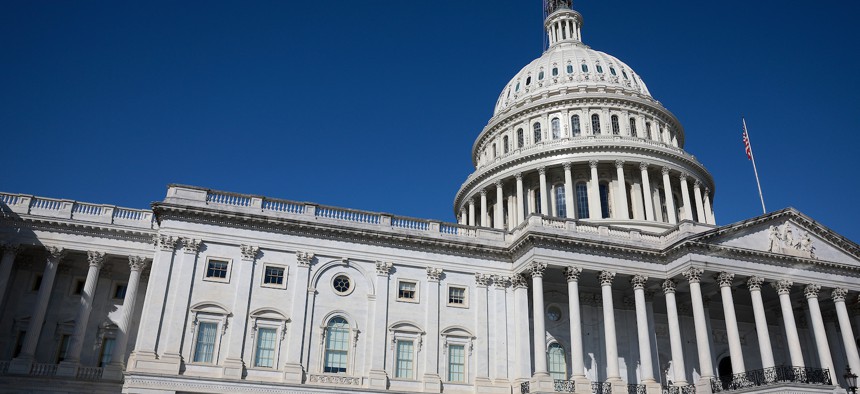House and Senate panels advance bills targeting federal tech

Joe Raedle/Getty Images
Bipartisan bills focused on government service delivery, contracting, custom code and more have recently been advanced out of committee.
House and Senate committees have advanced bipartisan bills looking to reform federal technology personnel, processes, acquisition and more. While it's not clear if and how any of these bills might pass through Congress in a busy election year with funding bills still in progress, a committee vote is one step toward becoming law.
Here’s what you need to know:
The House Oversight and Accountability Committee advanced the Government Service Delivery Improvement Act, backed by Rep. Ro Khanna, D-Calif, on Tuesday.
The proposal, which received bipartisan support, would require the director of the Office of Management and Budget to designate or appoint a senior official to lead efforts to improve the delivery of government services across the federal government. That OMB lead would be in charge of developing governmentwide service delivery standards, policies and guidance.
The bill’s proponents say that it would give Congress someone to go when agencies have service backlogs or other problems.
“Under our current system of government, there’s not a single individual that the American people can turn to and hold accountable for agencies’ actions and failures,” said Rep. William Timmons, D-S.C., one of the bill’s cosponsors, during the markup. “Without such direct supervision or accountability, agencies can continue to fall behind on the delivery of their services like the distribution of benefits or the effective handling of backlogs.”
The proposal would also require agencies to designate or appoint their own senior official for service delivery, who would be required to give OMB an implementation plan for improvements. The bill now goes to consideration before the full House. It does not have a Senate counterpart, although a group of senators have introduced their own government customer service proposal.
The House Oversight and Accountability Committee also advanced a bill from Reps. Kweisi Mfume, D-Md., and Glenn Grothman, R-Wis., meant to give the Congressional Budget Office easier access to executive branch data.
The Congressional Budget Office Data Access Act got bipartisan support in the committee and has already passed the full Senate. The proposal would exempt CBO from the Privacy Act of 1974. Lawmakers say that it is necessary to remove roadblocks CBO currently faces when accessing data.
The same House committee also advanced a new bipartisan proposal called the Information Quality Assurance Act. The lawmakers behind the proposal — Reps. Lisa McClain, R-Mich., and Katie Porter, D-Calif. — say that the bill is meant to guarantee that agencies use the best reasonably available information to inform their rules and guidance. It would require OMB to release guidance to help inform such rulemaking.
The bill also includes provisions to make models, methods and sources of information used by agencies public, with some limited exceptions, and doesn’t yet have a Senate counterpart.
The Senate Homeland Security and Governmental Affairs Committee also held a markup last week.
The committee advanced a bipartisan proposal meant to streamline certain contracting processes in government — like the solicitation and award of task and delivery order contracts — by giving all federal agencies certain flexibilities in place already at the Department of Defense. The bill, called the Conforming Procedures for Federal Task and Delivery Order Contracts, doesn’t yet have a House counterpart.
“My bipartisan bill will cut red tape surrounding the federal procurement process to make it more efficient and guarantee that a wider array of contractors, including small businesses, are considered for federal contracts,” said Sen. Gary Peters, D-Mich., in a statement. He is backing the bill alongside Sen. Joni Ernst, R-Iowa.
Finally, the same Senate committee also advanced the Source code Harmonization And Reuse in IT, or SHARE IT, Act.
The proposal — from Peters alongside Sen. Ted Cruz, R-Texas — is meant to prod agencies to publicly list custom code they develop or purchase and share it with other government agencies. It also doesn’t have a House counterpart.
As for the prospects of these and other government tech bills introduced this Congress so far, Mike Hettinger, president of Hettinger Strategy Group and former House Oversight staffer says “it’s hard to just get anything done."
Lawmakers and their staff will likely have to prioritize what they want to get done as the year progresses, he said, and try to pass those proposals either as standalone bills or roll them into the annual, must-pass defense policy bill.



